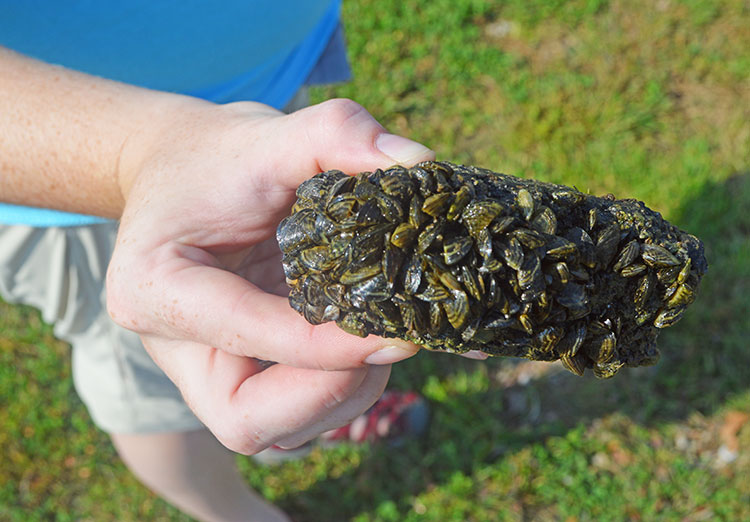
They aren't the type of mussels you'll find on a seafood menu.
"Zebra mussels consume considerable amounts of microscopic organisms, which depletes the food availability for fish and native aquatic species," said Allison Zach, coordinator of the Nebraska Invasive Species Program. "Their sharp shells can wash onto beaches and people can cut themselves."
Zebra mussels are small – about the size of a fingernail, Zach said. Native to the lakes of southern Russia, these freshwater mussels were first detected stateside in the Great Lakes in 1985.
And they've been spreading ever since.
"Zebra mussels reproduce at an alarming rate and their larva, called veligers, are very small and difficult to detect with the naked eye," Zach said. "They attach themselves to any solid surface including docks, underwater utility pipes, inside boat engines and on props. They can attach to boats and trailers and live on them for up to seven days out of water."
The only way to prevent their spread is to employ the "Clean, Drain and Dry" protocol for all boats, trailers and equipment between uses by following these steps:
• Inspect the boat, trailer and all equipment and remove any visible vegetation or organisms
• Pull boat plugs and drain live wells prior to leaving the water body
• Flush engine with water
• Dry boat and equipment for 5 days before launching into another water body
To date, zebra mussels have been found in three Nebraska water bodies: the Missouri River, Lake Zorinsky in west Omaha and Offutt Base Lake in Bellevue.
In 2010, Lake Zorinsky was drawn down and zebra mussels were killed by freezing. Since then, tests for zebra mussels have come up negative.
"This is one of only two successful eradications of zebra mussels in the U.S.," Zach said. "Unfortunately it is not feasible on the majority of infested lakes to drain them to the point of freezing out the population of mussels."
While the Missouri River has tested positive for zebra mussels, large populations have not been observed, likely due to water flows.
In April 2006, Offutt Base Lake became the first water body in Nebraska with a confirmed population of zebra mussels. In 2008 and 2009, the lake was treated with copper sulfate in an effort to eradicate the population.
However, an infestation of zebra mussels found in May 2014 indicates that the treatments were unsuccessful, and water samples taken from Offutt Base Lake as recently as September show that zebra mussels are still prevalent.
Samples can be collected two ways – with plankton net tows and with unmanned aerial vehicles (UAVs) developed by researchers in UNL's Department of Computer Science and Engineering.
"We envision that in a few years, scientists like Allison will have a small drone as a part of their toolset," said Sebastian Elbaum, professor of computer science and engineering.
A single person can easily and quickly deploy UAVs, allowing water monitors and scientists to collect more samples faster and in locations that may not be accessible by boats.
"Using a UAV is especially important in cases where waterways may have invasive species since it is extremely easy to decontaminate the small pump on our vehicle as compared to the decontamination required for kayaks or larger boats," said Carrick Detweiler, professor of computer science and engineering.
Although people are not allowed to launch motorized boats at Offutt Base Lake since the initial discovery in 2006, Nebraska's lack of a formal boat inspection program makes other water bodies vulnerable to infestation.
"We need a formal boat inspection program to keep our state from having more water bodies infested," Zach said. "Over the summer, Nebraska Invasive Species Program technicians asked boaters at high-risk water bodies if they would support an increase in boater registration fees to support aquatic invasive species prevention and management in Nebraska."
Of the 1,820 individuals surveyed, 90 percent supported a boat registration fee increase to fund such a program.
"This is very good news that the public is knowledgeable of zebra mussels and aquatic invasive species, and are willing to support an increase in boat registration fees to implement a boat inspection program in the state to protect our natural resources," Zach said.
With 21 infested water bodies in Kansas and the first infestation of quagga mussels recently discovered in South Dakota, developing and funding a boat inspection program in Nebraska will be key to keeping the state’s water bodies free of invasive species.
"We are very concerned about the zebra mussel infestations in surrounding states," Zach said. "With interstate boat travel, it is imperative to have a boat inspection program to educate the public and instruct them on how to 'Clean, Drain and Dry' their boats."
— Mekita Rivas, Natural Resources
More details at: http://neinvasives.com/